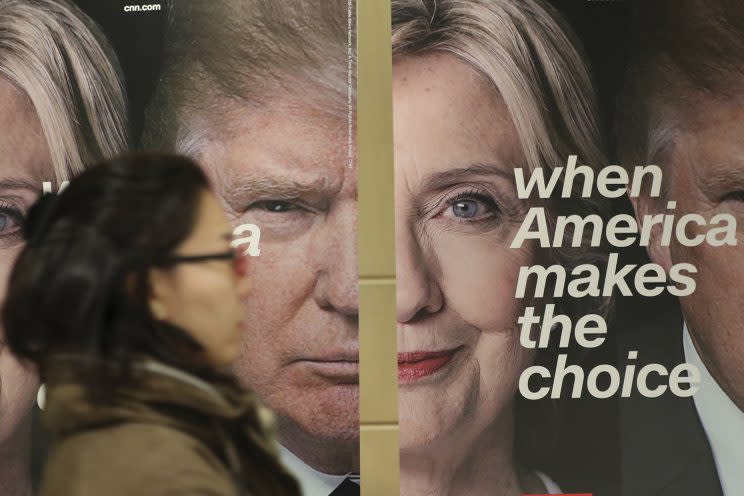Stories to watch: Ballot access and voting rights at risk

Donald Trump is in the White House, and Yahoo News is taking a look at the top stories to watch in his first 100 days. From the unusual role family members will play as White House advisers to his promises to aggressively transform U.S. trade policy, and from investigations into Russian interference in the election to his relationship with Paul Ryan, we’ll be rolling out 15 stories over five days — signposts for the road ahead.
_____
THE STAKES
President Trump’s universally debunked claim that the 2016 popular-vote tally included 3 million to 5 million illegal ballots, all for Hillary Clinton, continues to shadow last year’s election results. But the real issue going forward is ballot access, especially for minorities, in states where the protections of the Voting Rights Act have been lifted. Expect intense legislative and legal battles over “voter suppression” activities in swing states, especially in the South and Midwest.
_____
THE STORY
Long after the results of the 2016 election were in, Donald Trump continued to publicly seethe over losing the popular vote to Clinton by the not insubstantial margin of nearly 3 million. At a meeting with Congressional leaders, and on Twitter, he claimed that as many as 5 million ballots were cast by noncitizens, unregistered voters, people voting more than once, or “those registered to vote who are dead (and many for a long time).” He also claimed to know, somehow, that all of those votes went for Clinton.
When Democrats pointed out that Trump was alleging the most far-reaching criminal conspiracy in the history of American democracy, the White House said Trump would issue an executive order for a Justice Department investigation. The signing was announced for Jan. 26 but was canceled at the last minute, and as of a week later, had not been rescheduled.
Except for a handful of fringe conspiracy buffs, almost no one else believes anything like this occurred. It seems certain there are many, probably millions, of Americans still on the voting rolls after their deaths, or who are registered in two states after changing their residence — including, it turned out, at least five of Trump’s top aides and family members. But the number who actually voted illegally is vanishingly small in an electorate numbering well over 100 million. The big investigation Trump promised — if it ever actually takes place — may be no more productive than that of the investigators he once claimed to have sent to Hawaii to prove that President Barack Obama wasn’t born there.
The real news about last year’s vote was the ongoing tug-of-war over voter-identification laws between mostly Republican governors and legislatures, on the one hand, and voting-rights activists on the other. Toughening the requirements to register or to vote — for example, by requiring a driver’s license or equivalent form of photo identification — are described by one side as a necessary precaution against fraud, and by the other as a cynical maneuver to suppress turnout by minorities and the poor.
Notably, this was the first presidential election since the Supreme Court decision in 2013 that struck down a key provision of the Voting Rights Act. The section required nine states with a history of racial discrimination, mostly in the South, to get “preclearance” from the Justice Department for any changes in their voting laws or legislative district boundaries. Texas and North Carolina were among the previously covered states that moved aggressively to tighten voting requirements, but other states outside the South, such as Wisconsin, also followed suit. It is not clear how big a difference these laws actually made in the results, but statisticians will be poring over voting rolls and records to come up with estimates. Judges struck down some of these laws, but others survived, and appeals and further legal challenges will be playing out for months or years.
_____
THE PLAYERS
The next attorney general will presumably run the administration’s investigation into Trump’s allegations of vote fraud, and, more important, will be in charge of voting rights enforcement. Jeff Sessions, Trump’s nominee, has a record that many civil rights activists find troubling. One thing to watch for will be his key appointments, including his choice to run the Civil Rights Division.
The late Justice Antonin Scalia formed part of the 5-4 majority in the Voting Rights Act case. The Supreme Court is unlikely to revisit the issue anytime soon, but if other voting rights cases come before it, Scalia’s replacement could swing the court either way. Neil Gorsuch, Trump’s nominee, is regarded as a conservative who will emulate Scalia on most issues.
The source for Trump’s claim that more than 3 million illegal votes were cast appears to be a self-appointed watchdog named Gregg Phillips, who has been advocating for a crackdown on voting fraud for years. In an interview with Chris Cuomo of CNN, he said he would be able to prove his allegations, but that he needed “another few months” to prepare a report for the public.
_____
Read more from Yahoo News:




